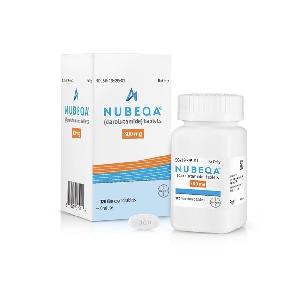Darolutamide Disease Interactions
There are 2 disease interactions with darolutamide.
Darolutamide (applies to darolutamide) hepatic impairment
Moderate Potential Hazard, Moderate plausibility. Applicable conditions: Liver Disease
Patients with moderate hepatic impairment (Child-Pugh Class B) have a higher exposure to darolutamide and reduction of the dose is recommended (see manufacturer package insert for recommended dose). No dose reduction is needed for patients with mild hepatic impairment. The effect of severe hepatic impairment (Child-Pugh C) on darolutamide pharmacokinetics is unknown.
References
- (2019) "Product Information. Nubeqa (darolutamide)." Bayer HealthCare Pharmaceuticals Inc.
Darolutamide (applies to darolutamide) renal impairment
Moderate Potential Hazard, Moderate plausibility. Applicable conditions: Renal Dysfunction
Patients with severe renal impairment (eGFR 15-29 mL/min/1.73 m2) who are not receiving hemodialysis have a higher exposure to darolutamide and reduction of the dose is recommended (see manufacturer package insert for recommended dose). No dose reduction is needed for patients with mild or moderate renal impairment. The effect of end stage renal disease (eGFR <15 mL/min/1.73 m2) on darolutamide pharmacokinetics is unknown.
References
- (2019) "Product Information. Adakveo (crizanlizumab)." Novartis Pharmaceuticals
Darolutamide drug interactions
There are 293 drug interactions with darolutamide.
Darolutamide alcohol/food interactions
There is 1 alcohol/food interaction with darolutamide.
More about darolutamide
- darolutamide consumer information
- Check interactions
- Compare alternatives
- Reviews (2)
- Side effects
- Dosage information
- During pregnancy
- Drug class: antiandrogens
- En español
Related treatment guides
Drug Interaction Classification
| Highly clinically significant. Avoid combinations; the risk of the interaction outweighs the benefit. | |
| Moderately clinically significant. Usually avoid combinations; use it only under special circumstances. | |
| Minimally clinically significant. Minimize risk; assess risk and consider an alternative drug, take steps to circumvent the interaction risk and/or institute a monitoring plan. | |
| No interaction information available. |
Further information
Always consult your healthcare provider to ensure the information displayed on this page applies to your personal circumstances.


